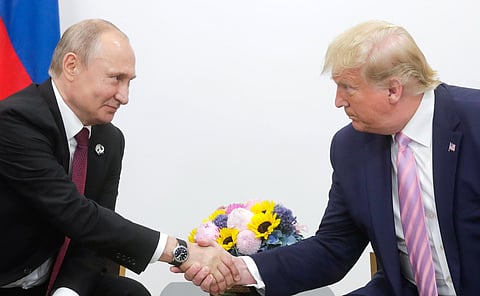

European and Ukrainian leaders are scrambling to influence U.S. President Donald Trump ahead of his phone call with Russian President Vladimir Putin scheduled for Monday, as anxiety grows in Western capitals over the possibility that Trump could adopt a stance more sympathetic to Moscow’s position on a ceasefire in Ukraine.
Tensions were palpable on Sunday, with fears that Trump might abandon support for Kiev or pressure Ukraine into accepting unfavorable terms under a deal brokered by Russia.
Ukrainian President Volodymyr Zelensky met with U.S. Vice President J.D. Vance and Secretary of State Marco Rubio in Rome on Sunday during the inaugural mass of Pope Leo XIV. Zelensky reportedly spoke with both U.S. officials for over 40 minutes, urging support for an unconditional ceasefire and advocating for additional sanctions on Russia to pressure Moscow into de-escalation.
German Chancellor Friedrich Merz also announced on Sunday that he—alongside the leaders of Britain, France, and Poland—intends to speak with Trump on Monday before his call with Putin. Merz, who was also in Rome, confirmed he had already discussed the upcoming call with Secretary Rubio.
While Merz framed the outreach as “preparation,” the underlying goal is widely believed to be a concerted attempt to influence Trump’s approach and prevent him from adopting a stance perceived as too accommodating toward Russia. European leaders are concerned that Trump may present Ukraine with terms it cannot accept, thus undermining Kiev’s negotiating position.
According to a Sunday report in The Washington Post, Zelensky and his senior aides are determined to prevent Trump and Putin from presenting Ukraine with a fait accompli—a settled arrangement made without Kiev’s consent. The anxiety stems from a May 10 call involving Zelensky and the leaders of Germany, France, Poland, and Britain, during which they coordinated a message to deliver to Putin: agree to a ceasefire by the following Monday or face increased sanctions. They reportedly believed they had Trump’s backing at the time.
However, when Putin proposed on Sunday morning that Ukraine and Russia resume direct negotiations in Istanbul the following Thursday, Trump quickly expressed support for the idea. According to reports, when Zelensky—who was in Ankara at the time—initially refused to meet the Russian delegation unless Putin himself was present, both Trump and Turkish President Recep Tayyip Erdoğan urged Zelensky to send negotiators.
Ukrainian and Russian delegations did meet in Istanbul on Friday for two hours, but no substantial progress was made toward a ceasefire.
Now, with Trump signaling support for direct U.S.-Russia engagement to end the war, European and Ukrainian officials fear a shift in American policy—from sanctioning Russia and arming Ukraine to potentially endorsing Russian terms for a settlement.